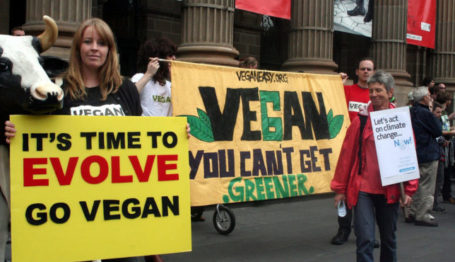Organization Trends
Slaughterhouse Rules: Mercy Killings


Slaughterhouse Rules (Full Series)
Rights for Animals | Disregard for Human Life | Mercy Killings | The Next Generation
Summary: People for the Ethical Treatment of Animals (PETA) claims it’s the “largest animal rights organization in the world.” But scandal after scandal has revealed a disturbing record of hypocrisy that’s left tens of thousands of household pets dead in PETA’s kill rooms. The carnage is the product of a radical ideology that values animals more than humans—and it’s prepared to go to any length to prove it.
People for the Ethical Treatment of Animals’ antics have doubtless put the group in hot water. But its campaigns against private companies show the group’s real cunning and knack for cutting a deal the victims can’t refuse. PETA has been known to purchase volumes of stock in targeted publicly traded firms—then use its shareholder position to pressure management into making the changes PETA wants to see.
It’s called “shareholder activism,” and PETA isn’t the first—or the largest—left-wing group engaged in it. In 1987, the animal rights group purchased stock in Procter & Gamble, then unsuccessfully filed a shareholder resolution calling for an end to animal testing. In 2017, it tried a similar gambit by purchasing 230 shares (about $4,000) in Canada Goose, a Canadian luxury outfitter. PETA executive vice president Tracy Reiman then called for “consumers to reject Canada Goose’s cruelty to coyotes and geese and to invest in kindness by buying vegan clothing instead.”
PETA’s list of corporate campaigns reads like a mafia hit list. According to its 2016 tax filings, the group spent nearly $10.5 million on its international campaign against the use of animals in the “food, clothing, experimentation, and entertainment industries,” organizing an astounding 2,400 demonstrations. Those campaigns pressured Dunkin’ Donuts to sell almond milk at all of its retail locations, Olive Garden to make its minestrone soup vegan, and Starbucks, the Coffee Bean & Tea Leaf, and a number of major restaurant chains to place vegan food on their menus.
Retailers Dutch LLC and Jo-Ann Stores also agreed to ban the sale of fur items in their stores after a little PETA “persuasion.” Global Brands Group (which controls a number of major brands, like Juicy Couture) and Overstock.com were also targeted in a campaign to end the sale of products made from Angora wool.
Car manufacturer Tesla halted the production of leather seats and made “all seats vegan,” ridesharing firm Lyft eliminated the leather seats requirement for its premium vehicle service, and clothing retailer H&M “pulled leather from its conscious exclusive clothing line.”
The tyranny doesn’t end there. In 2017, years of PETA’s relentless harassment of the Ringling Bros. and Barnum & Bailey Circus came to an end when the famous traveling circus company—in operation since 1871—closed. The troupe called it quits “after three decades of PETA campaigns, protests, and complaints to the U.S. Department of Agriculture,” the activists boasted. “And after hearing from PETA, numerous business and venues… vowed not to host circuses that use animals.”
PETA was also active in the efforts to ban fur-farming in Europe. In 2017, Croatia’s ban went into effect. PETA was immediately congratulated by Davor Škrlec, a member of the Croatian Parliament, for its “comprehensive and successful initiative” in the ten-year campaign.
PETA Kills Animals
Considering the lengths to which it’s willing to go, it’s perhaps unsurprising that PETA takes uncompromising stances on the everyday use of animals. The organization protests testing hygiene products and pharmaceuticals on animals, has called cow’s milk the “perfect drink of choice for all…white supremacists,” and opposes keeping dogs and cats as pets or as guide animals for the disabled. Animals, after all, are people. Newkirk herself said in 2005 that she plans to “send my liver somewhere in France, to protest foie gras…have handbags made from my skin…and an umbrella stand made from my seat.”
But despite its rabid agenda, PETA kills an outrageous number of pets each year. Since 1998, the organization has killed at least 36,000 dogs and cats, according to its annual reports to the Commonwealth of Virginia. While the percentage has decreased recently to 74 percent of received pets in 2017, PETA has always killed the large majority of dogs and cats it receives—in some years over 97 percent, and often over 90 percent.
Perplexingly, the People for the Ethical Treatment of Animals is staunchly opposed to so-called “no-kill” shelters for pets, claiming they promote animal overpopulation and poor conditions for the caged creatures. Euthanasia, the group argues, is done “out of compassion.”
Yet a state government inspection of PETA’s headquarters in 2010 found that, over two months, a shocking 84 percent (245 of 290) of the dogs and cats collected by PETA were euthanized within 24 hours. The report also revealed PETA’s adoption rate fell from an already-low 14 percent in 2004 to just 0.7 percent in 2009. That means 99.3 percent of pets were killed.
PETA claims that, to a first approximation, all the pets it receives are diseased, abused, and unadoptable. But in March 2017 Heather Harper-Troje, an ex-employee of PETA’s Community Animal Project, filed an affidavit accusing the project of “euthanize[ing] puppies and kittens and other highly adoptable animals”—often on Ingrid Newkirk’s direct orders. According to Harper-Troje, Newkirk “said that an effort to adopt out an animal was a waste of PETA’s money and effort.” Harper-Troje was even instructed by her supervisors “to tell people that we would find good homes for the dogs and cats, even though we knew the animals would be euthanized.”
PETA has dismissed Harper-Troje as a disgruntled former employee, but the allegations stuck. In August 2017, the group was forced to settle for almost $49,000 and an apology with a family in Virginia after it picked up their unattended chihuahua and euthanized it that day, violating a Virginia law requiring a five-day grace period.
It doesn’t help the group’s reputation that it has a massive, $9,300 walk-in freezer with four large trash cans to house the corpses prior to cremation, according to another employee.
In the conclusion of Slaughterhouse Rules, learn how PETA plans to inculcate young minds with funding from some of the Left’s biggest donors.

